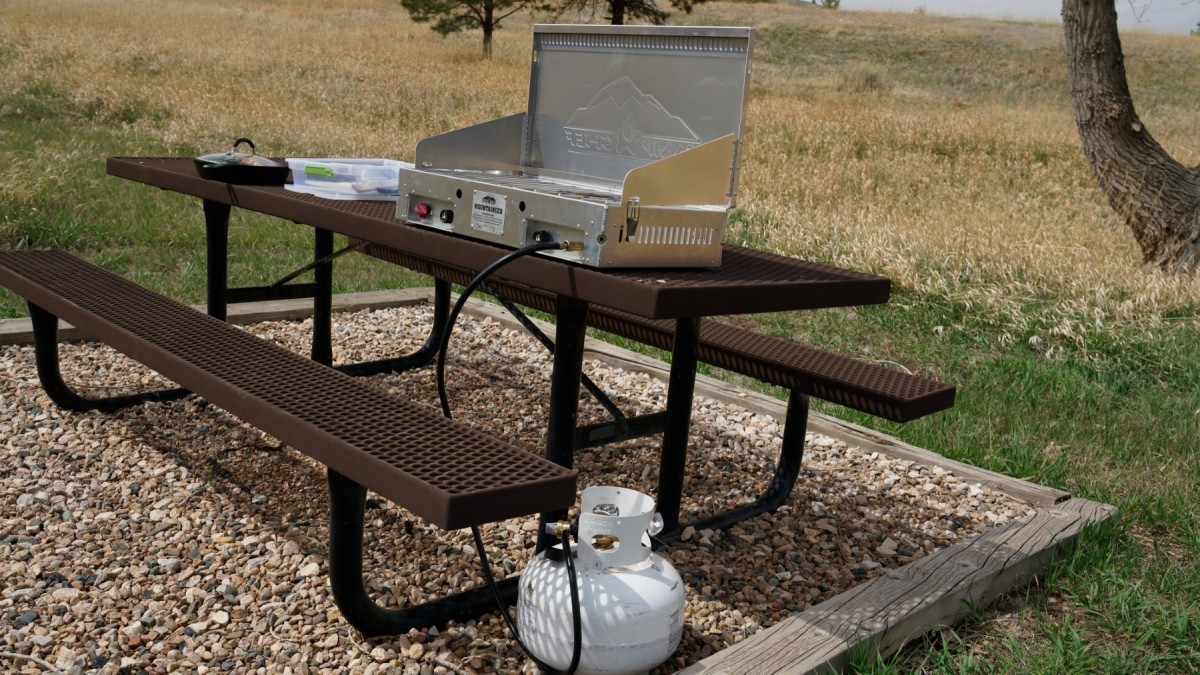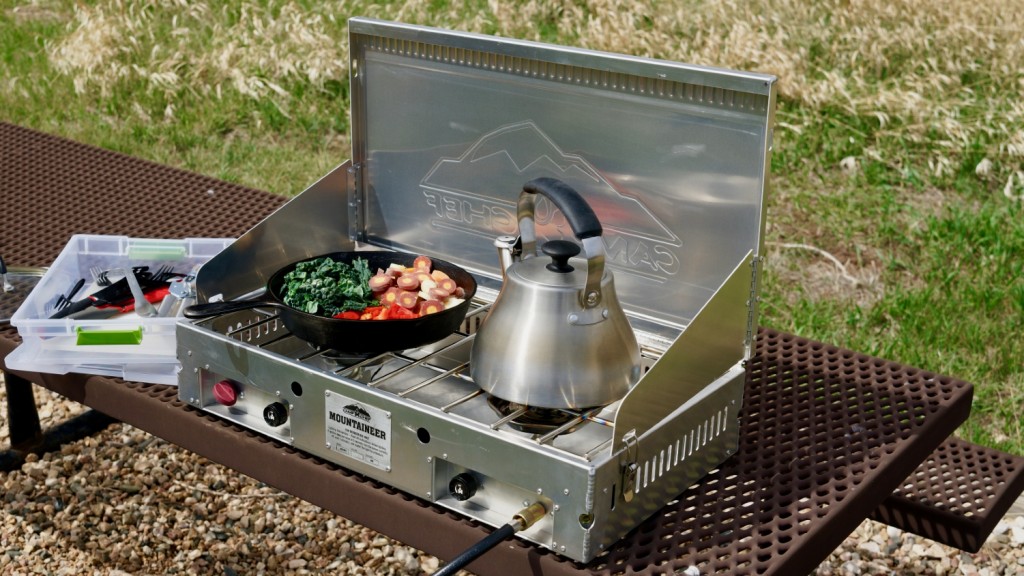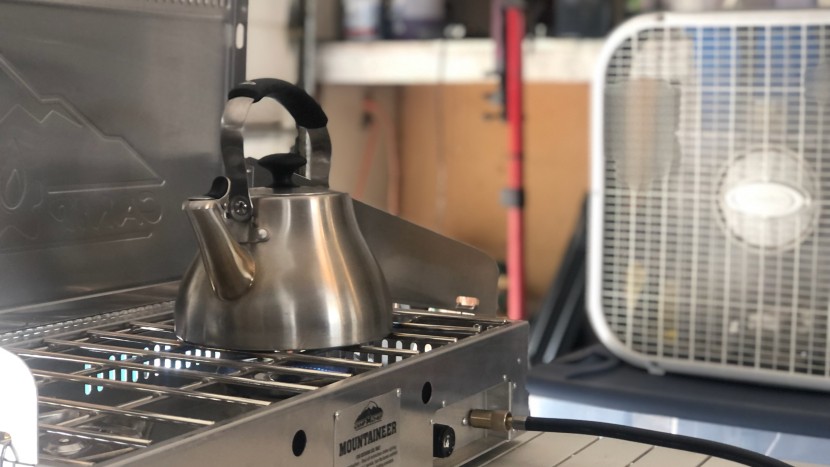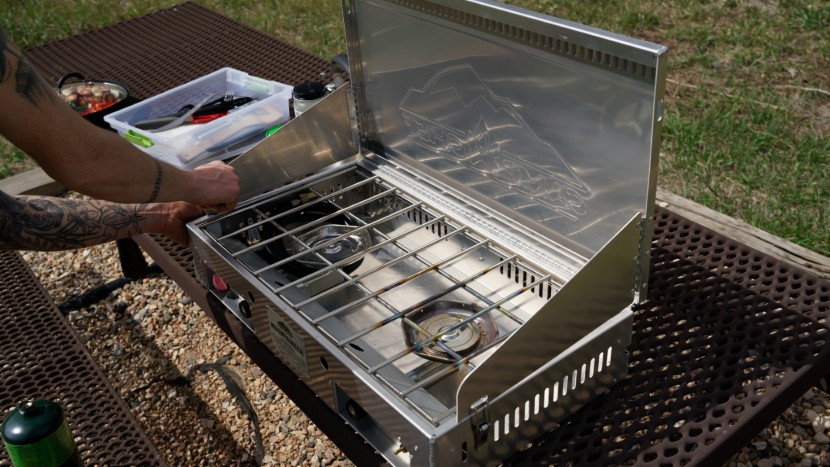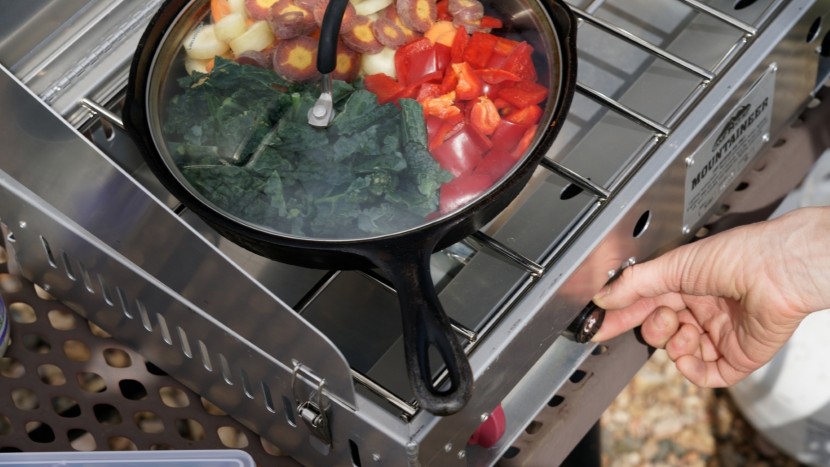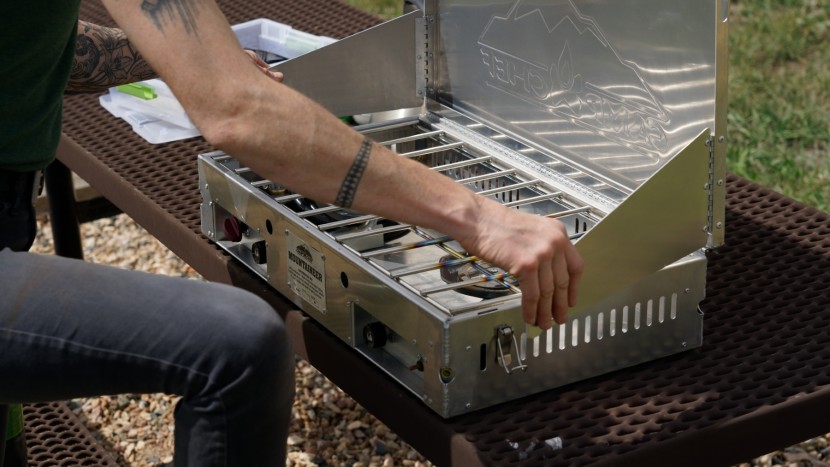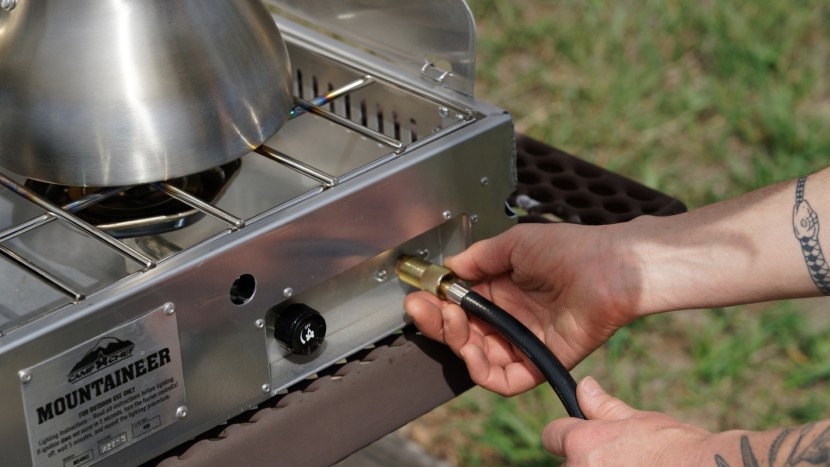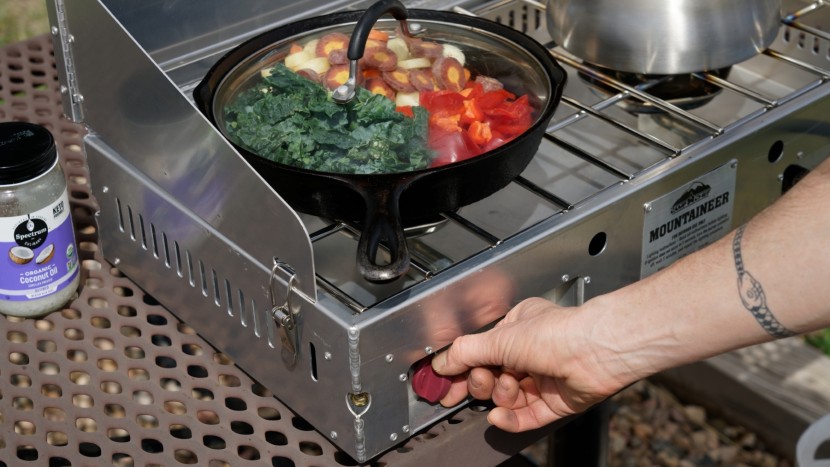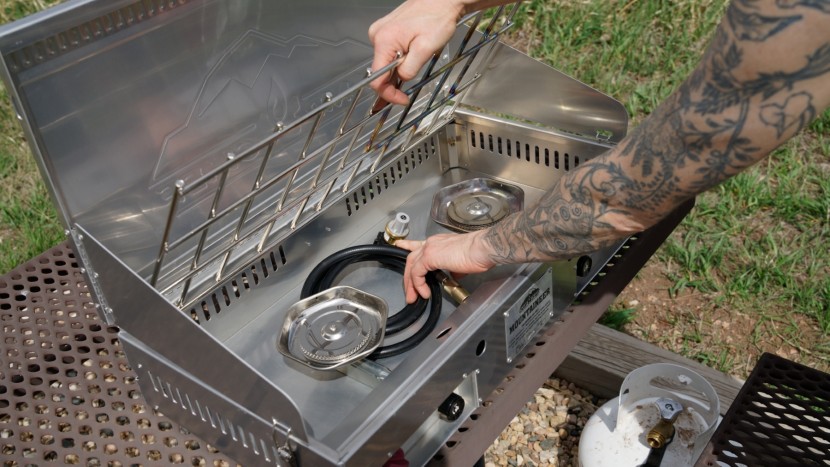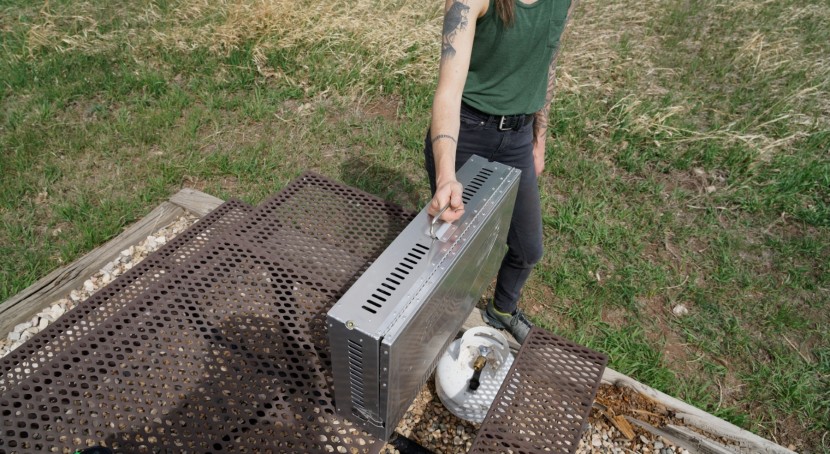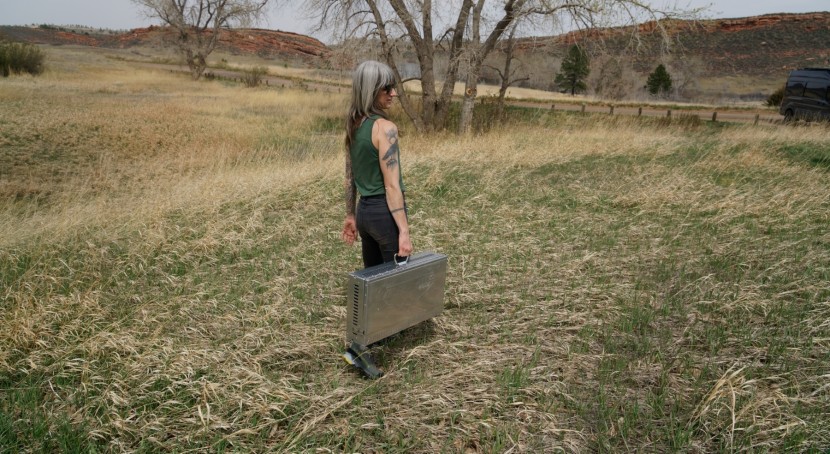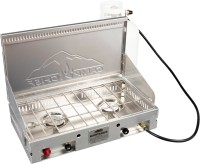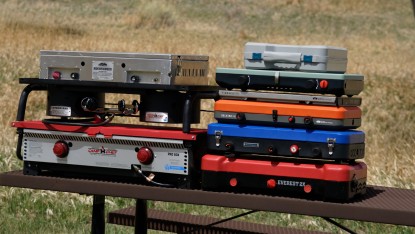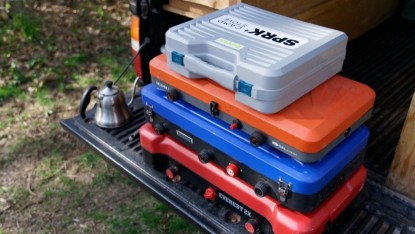
Our Verdict
Our Analysis and Test Results
The Camp Chef Mountaineer is a top-shelf stove at a premium price. We were impressed with how often this stove outperformed the competition. It is powerful, has great wind resistance and excellent fuel efficiency, and is easy to clean. While it had a slightly slower boil time than some of the higher octane stoves, it works well in the wind. Compared to other stoves in our review, this one is relatively heavy and takes up slightly more space than average, but it makes up for this in terms of durability and ease of use.
Boil Time
Our review team has designed a number of tests to evaluate stove performance as consistently and objectively as possible. Our first test involves measuring how long it takes to boil 1 liter of 58°F water in both “windy” and windless conditions. We take the average of these two scores to determine a final rank for each stove. The average boil time for the Mountaineer was 4 minutes 25 seconds, which is the third fastest boil time in our review.
We conduct the boil tests in our garage “lab” at 5,000 feet above sea level. For the “windy” test, we situate the stove adjacent to a box fan and use a pocket anemometer to ensure a constant “wind” of 2-4 mph. In the windy test, it took the Mountaineer 4 minutes and 46 seconds to boil 1 liter of water and 4 minutes 4 seconds in the windless test. This means it only took 40 seconds longer to boil water with wind than without. This excellent performance is owed, in part, to having high-powered burners and top-notch design elements. The windscreen creates a tight seal, and the burners are recessed deep in the stove body. These two design features effectively shield the burners from wind coming from almost any direction. Beyond that, the Mountaineer boasts two 20,000 BTU burners.
Fuel Efficiency
In addition to evaluating each stove for boiling speed with and without wind, we also collect data to determine the fuel efficiency of each stove. The Mountaineer was the most fuel-efficient stove in our review.
For this test, we measure the weight of a propane tank before and after the windy and windless boil tests. Then we rank the stoves based on the average amount of fuel consumed during the two tests. Over these two tests, the Mountaineer consumed an average of 0.64 ounces or 0.16% of the fuel in the tank. Both of these metrics were the lowest in our review. We always do the windy test first, as stoves burn more fuel in windy environments and are more efficient the more fuel they have in the tank. In the windy test, the Mountaineer burned 1.28 ounces of fuel or 0.32%, which is a nominal amount relative to the weight of the tank. After the windless test, our scale couldn't discern a measurable difference in the propane tank before and after the test. Stoves that use a large propane tank (ours is an 11-pound tank) all have much higher fuel efficiency. This could be due to our scale being less sensitive at the higher range, or it could be due to them simply consuming less fuel. Regardless of whether it is a design advantage or a test flaw, our data shows that this stove strikes an impressive balance between wind resistance, power, and fuel efficiency.
Simmering Ability
The Mountaineer performed well in this category, owing in part to the tight burner knobs, which offer the fine control necessary to dial the burner down to a simmer.
To evaluate each stove for its simmering ability, we make a pot of rice, which requires the burner to remain on low for 20+ minutes while the rice cooks. The Mountaineer was able to sustain a low enough flame to produce delectably fluffy rice. Despite the high BTU power — at 20,000 per burner — there is a sufficient gap between the burner and cooking grate to protect your pot from large flames. We were pleased with how well this stove sustained a low temp to avoid ruining more complex meals.
Ease of Use
We appreciate the Mountaineer for its low maintenance set-up, care, and use, earning it top marks in this category.
The windscreens on the Mountaineer snap easily into place with aluminum buckles on the side of the stove, and these buckles double as the closure system. The regulator hose fits nicely beneath the cooking grate for easy transport.
The regulator easily screws onto an external port adjacent to the burner knob on the right-hand side of the stove. Our review team loves stoves with low-hassle regulator ports, as it can be easy to destroy brass regulator threads when the port is difficult to access or align. As long as you're mindful, this shouldn't be an issue with the Mountaineer.
Piezo-electric igniters seem to have become almost an industry standard on stoves at all price points. While a lighter should always be a part of your camping kit, it makes life easier to flip a switch to light your burner. These ignitors are a great feature, but not all igniters are created equal, and most have a limited lifespan. That said, the igniter on the Mountaineer worked consistently throughout the course of our testing.
To clean the Mountaineer, all you have to do is lift up the cooking grate and wipe it down. This stove doesn't have a false bottom to house all the stove components, so there isn't anywhere funny to lose errant food scraps. Given that the stove is aluminum, it is easy enough to scrub it down and make it look new every time.
Portability
Compared to the other stoves in our review, portability is not one of the categories where the Mountaineer earns top marks. With packed dimensions of 25.25" x 14.25" x 5.5" and weighing in at 14.63 pounds, this stove is one of the larger and heavier tabletop options in our review.
That being said, there is a reason why portability is one of the lowest-weighted metrics in our review. When you are car camping, you're likely to have more space, and you probably won't need to carry your stove farther than a few dozen feet to a picnic bench. Are there lighter-weight and more compact stoves in this review? Absolutely! And if this is critical for you, then we recommend you seek one of them out. Otherwise, this stove is still portable enough to warrant some extra heft for high performance.
You can increase the portability of the Mountaineer by getting a 5-pound refillable propane cylinder. Unless you're truly strapped for space, the Mountaineer is still quite easy to carry around, and despite being one of the heavier stoves in our review, we were never really bothered by its size and weight.
Should You Buy the Camp Chef Mountaineer 2X?
This is a premium stove at a premium price. While the cost is rather steep, the Mountaineer is designed and built for the long haul. With an aluminum body and high-powered burners, we were impressed by the power, fuel efficiency, wind resistance, and durability. In an era when planned obsolescence is baked into the design of most products, this stove bucks the norm. If you're looking for a durable camping stove to last for decades, we think you'll be impressed by the quality of this one.
What Other Camping Stoves Should You Consider?
If you love a well-designed and high-ranking stove but are looking to save some money, we recommend the Camp Chef Everest 2X. It performed almost as well in every metric at nearly half the price. For the gear nerd that craves a more portable and feature-rich stove, check out the JetBoil Genesis Basecamp, which can pair with other JetBoil stoves using the “JetLink Accessory Port.”
| Awards | Best Designed Stove |
|---|---|
| Price | $470 List Check Amazon (on sale!) |
Overall Score  |
|
| Star Rating | |
| Bottom Line | A top-shelf stove that is built to last, featuring powerful but fuel efficient burners and great wind resistance |
| Pros | Durable, powerful, wind resistant, fuel efficient, piezo-igniter, simmers well |
| Cons | Very expensive, heavy, large |
| Rating Categories | Camp Chef Mountainee... |
| Boil Time (25%) | |
| Fuel Efficiency (25%) | |
| Simmering Ability (20%) | |
| Ease of Use (15%) | |
| Portability (15%) | |
| Specifications | Camp Chef Mountainee... |
| Total BTUs | 40,000 |
| Number of Burners | 2 |
| Cooking Surface Dimensions | 25.25" x 12.5" |
| Piezo Ignitor | Yes |
| Measured Weight | 14.63 lbs |
| Average Boil Time (1 liter of water, wind & no wind) | 4 min 25 sec |
| Boil Time (1 liter of water, wind from a box fan) | 4 min 46 sec |
| Boil Time (1 liter of water, no wind) | 4 min 04 sec |
| Cooktop Material | Aluminum |
| Packed Size | 25.25" x 14.25" x 5.5" |
| Burner/Flame Diameter | 3.5" |
| Distance Between Burners (center to center) | 11.75" |
| Windscreen | Yes |
| BTU per Burner | 20,000 |
| Type of Model | Tabletop |
| Fuel Type | Propane - large 20# tank |
| Model Number | MS40AX |


